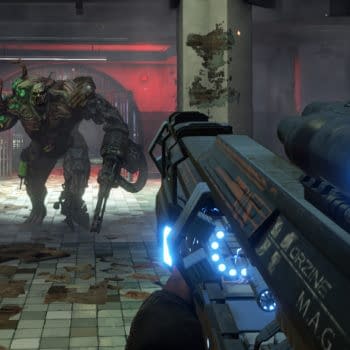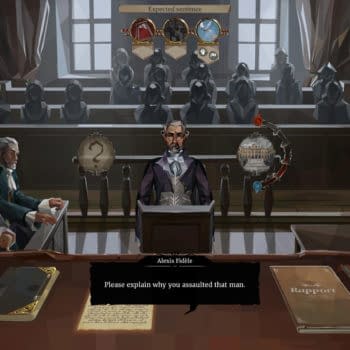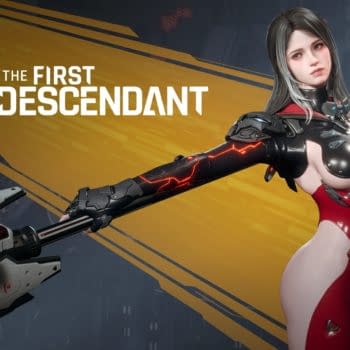Posted in: Games, Video Games | Tagged: Beyond: Two Souls, David Cage, detroit become human, Guillaume de Fondaumiere, heavy rain, Quantic Dream
Quantic Dream's David Cage Has Always Been a Ticking Time-bomb
Quantic Dream issued a statement over the weekend that they shopped around to various media outlets that published articles covering the workplace misconduct allegations published in several French publications that specifically targeted studio heads David Cage and Guillaume de Fondaumière.
That statement reads:
Articles published today [January 14] level various allegations against Quantic Dream, its management and employees.
We categorically deny all of these allegations. Quantic Dream filed a complaint several months ago and further complaints will follow.
We invite interested parties to read the responses of our Employee Representatives and Health & Security Committee to questions submitted by the journalists prior to publication.
Inappropriate conduct or practices have no place at Quantic Dream. We have taken and always will take such grievances very seriously.
We value every single person who works at Quantic Dream. It is of utmost importance to us that we maintain a safe environment that allows us all to channel our shared passion for making video games.
That statement falls in line with reactions and statements given by Cage and de Fondaumière following the reveal of the employee reports. And is particularly tone-deaf considering the nature of the complaints, the current sociopolitical climate, and Quantic's slate of games.
Let's be honest with ourselves for just a moment here, nothing in life exists in a vacuum. Not even video games. And now more than ever the casual sexism embraced and protected by the gaming community is going to take out quite a few games, developers, and studio heads in the resulting fallout. Thanks to the continued strength of the #MeToo movement which -despite many complaints to the contrary- does not appear to be slowing, the allegations pinned at Quantic Dream and studio heads Cage and de Fondaumière are heavier than ever. And they should be. Quantic Dream has a pretty shady history if you look back at their prior slate of games.
Ellen Page appeared in Beyond: Two Souls but after dataminers found that they could access a virtual simulacrum of her naked body in-game, she considered pressing legal action against the studio. In the end, Page decided not to follow through, we can't discount the fact that she considered suing the studio. Quantic Dream, including Cage and de Fondaumière as co-founders, willingly violated her bodily autonomy by coding a naked avatar for her character to be used in a shower scene in the game. While the avatar is not based on Page's real-life body, they intended to present a naked Ellen Page to their audience of gamers to be consumed, all without her consent.
And if you look beyond that one instance, you'll find many other questionable moments in both Heavy Rain and Beyond: Two Souls.
- In Heavy Rain there is a sequence in which the game's heroine Madison is forced to strip at gunpoint.
- Just before the "stripping at gunpoint" sequence, the camera gives us a couple of clear up-skirt shots of Madison before focusing prominently on her butt.
- Madison is almost raped by an anonymous man in a mask in a dream sequence called "Sleepless Night." This scene does not exist to advance the plot of the game in any way.
- Just before the dream sequence in which Madison is almost raped, we get a lengthy sequence of her in the shower with the game's "camera" paying particularly close attention to her breasts and butt.
- Madison is almost raped by an electric drill during the red-herring scene with The Doc.
- Depending on player's actions in Two Souls it is heavily implied that the teenage protagonist Jodie is assaulted and gang-raped by a group of boys at a bar. In full view of the casually retreating bartender.
- The Native American grandmother plays an incredibly racist "wise woman" role in Beyond: Two Souls.
- There are two shower scenes with Jodie, though much less sexualized as the camera focuses mostly on her face and shoulders. Without using dev controls, you cannot force the camera to view Jodie's naked body.
In the end, it is obvious that Madison exists in Heavy Rain just to be Ethan's "happy ending." She experiences sexualized violence at almost every turn, with pretty much every male she has an interaction with wanting to violate her in some way, shape, or form. And then we get to Ethan, and we get to control every single aspect of his sex scene with Madison. We have to sit at the controls for every item of clothing stripped from her body and for every awkward fondle of her naked form.
Beyond: Two Souls is a little bit better in its treatment of Jodie, but not by much. Jodie is still the victim of sexualized violence. Her body is sexualized by the "camera" in far too many scenes. Keep in mind, Jodie is an underage girl despite being played by an older Ellen Page. The one sequence in which Cage seems to handle sexual violence well is the scene in which a homeless Jodie is offered money in return for a blowjob. The scene is presented in a way that makes the power dynamic there obvious and threatening, and rightfully so. That sequence does not exist to titillate the audience with sexual violence against a woman, but rather to highlight a frightening and real experience lived by many women.
And then there's Detroit: Become Human. At Paris Games Week, Cage ignited a whole lot of hate over his choice to focus Quantic's presentation on a scene of domestic violence and child abuse. Much of the backlash against the Detroit presentation is because it normalizes child abuse. And, well. Cage did feature a verbally abusive and controlling father in Two Souls, so this does seem to be something of familiar territory for the director. And the trailer is an upsetting watch. We sit back as Kara and are instructed not to get involved when Todd goes after his young daughter in a rage. Alice screams, and then we witness Todd lowering her lax body onto a bed and charging at Kara screaming "this is all your fault." And the reason we see this is so that Quantic Dream can highlight the fact that in Detroit, we as the androids can control what happens. We can stop Todd from going after Alice.
Which is a pretty heavy power fantasy given to you at the cost of a little-girl's abuse.
In one of the possible endings presented by the trailer, Alice shoots her own father to save Kara.
And the entire purpose of the trailer is to show you the way the decision tree works in the game. This could have been shown in any other way. A lot of games include complicated decision trees, and none have used the abuse and murder of a little girl as the way to do it.
And that's ignoring the early part of the Paris Games Week demonstration which showed us a female android being pieced together by robotic arms and left to stand naked, answering questions of a male who stands off camera. She's then given underwear. And told she will be disassembled. Meanwhile, David Cage talks over the scene about how happy he is with the actress Valorie Curry's performance.
While each one of these instances is questionable, given together as a body of work we are presented with an image of Quantic Dream, Cage, and de Fondaumière as cavalier, as enjoying sexualized violence against women, of casual racism and unaware of the lazy racial stereotypes used to create stories that exist as male power fantasies.
That's not even touching the allegations about the horrific working conditions and boys-club antics that are alleged to go on at Quantic Dream's headquarters.
In a world where society is finally taking a closer look at the way we react to sexual violence, harassment, assault, and misconduct, Quantic Dream and David Cage are ticking time-bombs.





![[REVIEW] "Gang Beasts" is Zany Party Madness](https://mlpnk72yciwc.i.optimole.com/cqhiHLc.IIZS~2ef73/w:350/h:350/q:75/rt:fill/g:ce/https://bleedingcool.com/wp-content/uploads/2019/09/gang-beasts-7-350x350.jpg)




![[REVIEW] "Divinity: Original Sin II" Definitive Edition is Almost Perfect](https://mlpnk72yciwc.i.optimole.com/cqhiHLc.IIZS~2ef73/w:350/h:350/q:75/rt:fill/g:ce/https://bleedingcool.com/wp-content/uploads/2018/08/Divinity-Original-Sin-2-Definitive-Edition-art-350x350.jpg)





